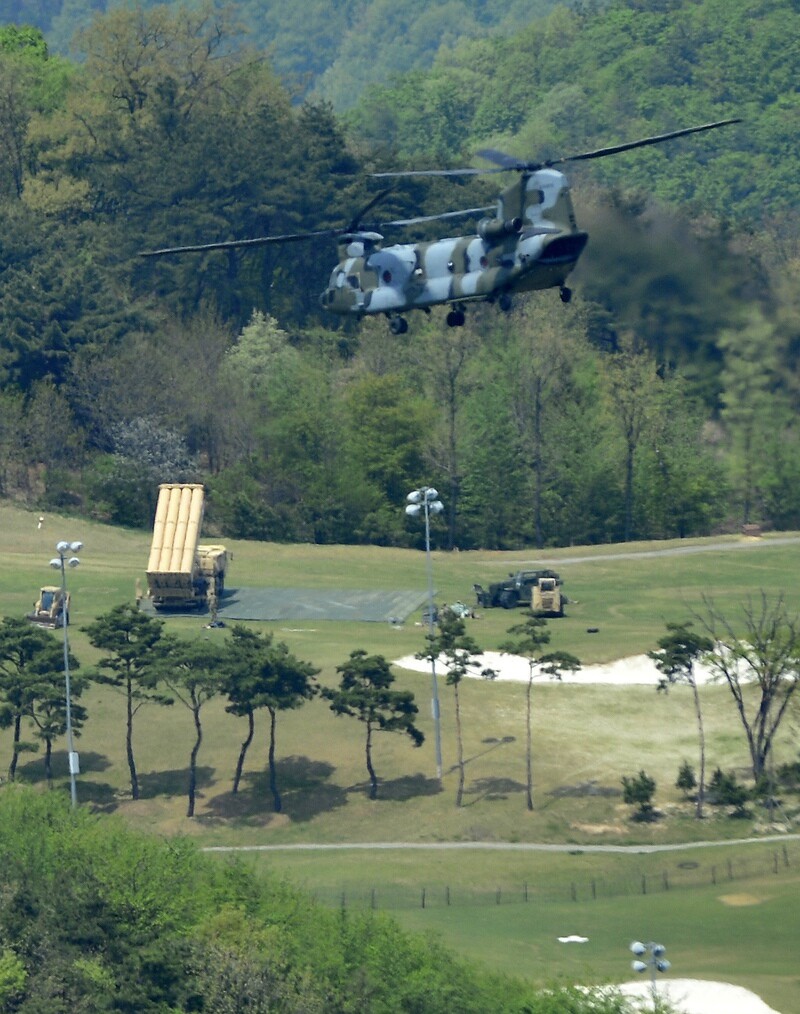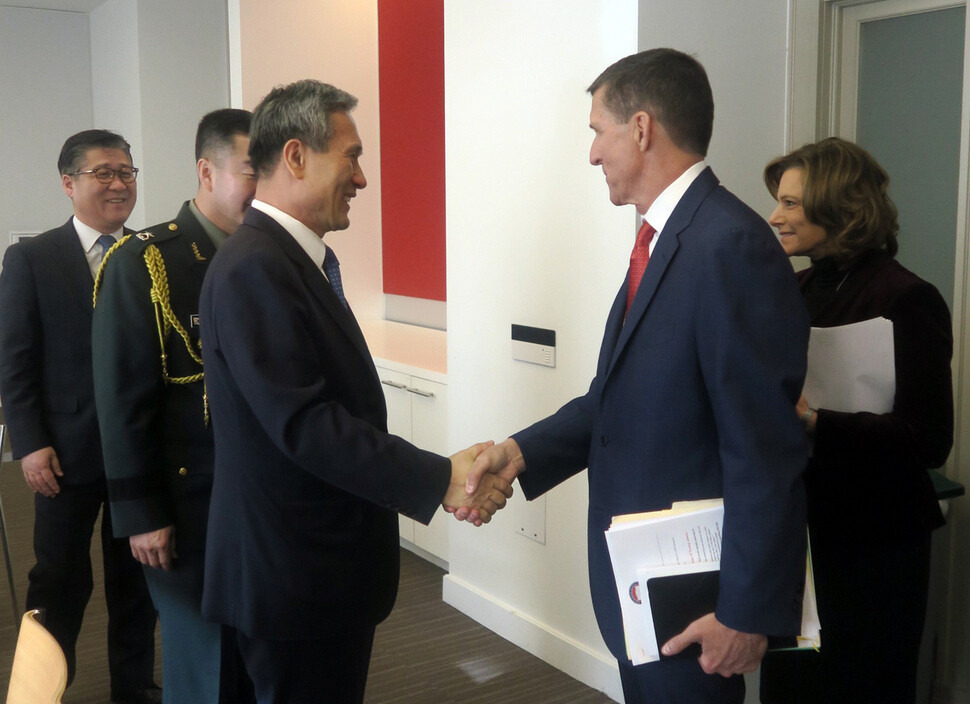hankyoreh
Links to other country sites 다른 나라 사이트 링크
Who is rushing the THAAD deployment, and why?

It happened like a sneak attack in the dead of night. All set procedures were utterly disregarded. With US Forces Korea and the Ministry of National Defense proceeding on Apr. 26 with the deployment of a Terminal High Altitude Area Defense (THAAD) missile defense system, the question for many now is just who made the decision and when. Whoever it was - and whatever their intentions - is likely to face accusations of interfering in the May 9 presidential election, where the THAAD issue was certain to be a key point of contention.
The THAAD deployment has been timed to coincide with the election from the beginning. In announcing the decision on July 8 of last year, the Ministry of National Defense and USFK said combat placement would happen “no later than late next year [2017].” At that time, no one was even discussing the possibility of then-President Park Geun-hye‘s impeachment, so the next presidential election would have been scheduled for December of this year.
Initially, the actor behind the deployment decision was the Blue House Office of National Security. Indeed, many are now questioning whether that office’s chief Kim Kwan-jin is essentially directing the deployment even after Park’s ouster.
At the time of the ministry’s announcement last year, Justice Party lawmaker Kim Jong-dae declared that the Office of National Security and USFK were “essentially making decisions through direct contact without going through the Ministry of National Defense,” and that the ministry was “picking up after them.” It was a reversal from the position stated at a National Assembly Q&A session on July 5 - three days before the announcement - by then-Minister of National Defense Han Min-koo, who said he would be “cautious” with the THAAD deployment.
The US has also been outwardly cautious on the deployment’s schedule. A number of officials visiting South Korea this year - including Secretary of Defense James Mattis in February, Secretary of State Rex Tillerson in March, and Vice President Mike Pence in April - merely confirmed that the deployment would be going ahead on schedule, without specific mention of the date. Only South Korea was talking about a “swift deployment.”

The ball truly began rolling around late February, when allegations surfaced that Mattis and Han had reached an agreement during the former’s visit to “sneak” THAAD equipment onto the Seongju golf course before the election. Indeed, on the evening on Mar. 6 USFK brought a portion of its THAAD equipment onto Osan Air Base. The move came four days before the Constitutional Court decision removing Park Geun-hye from office.
Attention now is turning to the actions taken by Kim Kwan-jin as Office of National Security chief. Kim has visited the US a total of three times since his June 2014 appointment. Two of the visits came in January and March of this year, after the National Assembly vote to impeach Park. In both cases, the key focus was on an “unhindered” THAAD deployment.
“The Blue House Office of National Security chief is a presidential adviser whose job is communicating messages from the President, not engaging in diplomacy him or herself,” said one foreign affairs and national security expert.
“It’s hard to fathom a reason for [Kim] visiting the US no fewer than two times while the President was absent following her impeachment,” the expert said. The circumstances are also the reason many are now speculating Kim was pushing for a swift THAAD deployment on Park’s behalf.
“From the process to date in terms of speeding up the THAAD deployment, it looks like South Korea has been aggressive about requesting it and the US has been taking advantage of that,” said Korea National Strategy Institute director Kim Chang-soo.
“They‘ve committed the folly of pushing to have the deployment happen before the election at all costs, without thinking about what issues this kind of procedural irrationally is going to cause later,” Kim said.
By Jung In-hwan, staff reporter
Please direct questions or comments to [english@hani.co.kr]

Editorial・opinion
![[Guest essay] Amending the Constitution is Yoon’s key to leaving office in public’s good graces [Guest essay] Amending the Constitution is Yoon’s key to leaving office in public’s good graces](https://flexible.img.hani.co.kr/flexible/normal/500/300/imgdb/original/2024/0416/8917132552387962.jpg) [Guest essay] Amending the Constitution is Yoon’s key to leaving office in public’s good graces
[Guest essay] Amending the Constitution is Yoon’s key to leaving office in public’s good graces![[Editorial] 10 years on, lessons of Sewol tragedy must never be forgotten [Editorial] 10 years on, lessons of Sewol tragedy must never be forgotten](https://flexible.img.hani.co.kr/flexible/normal/500/300/imgdb/original/2024/0416/8317132536568958.jpg) [Editorial] 10 years on, lessons of Sewol tragedy must never be forgotten
[Editorial] 10 years on, lessons of Sewol tragedy must never be forgotten- [Column] A death blow to Korea’s prosecutor politics
- [Correspondent’s column] The US and the end of Japanese pacifism
- [Guest essay] How Korea turned its trainee doctors into monsters
- [Guest essay] As someone who helped forge Seoul-Moscow ties, their status today troubles me
- [Editorial] Koreans sent a loud and clear message to Yoon
- [Column] In Korea’s midterm elections, it’s time for accountability
- [Guest essay] At only 26, I’ve seen 4 wars in my home of Gaza
- [Column] Syngman Rhee’s bloody legacy in Jeju
Most viewed articles
- 1Faith in the power of memory: Why these teens carry yellow ribbons for Sewol
- 2[Guest essay] Amending the Constitution is Yoon’s key to leaving office in public’s good graces
- 3[Editorial] 10 years on, lessons of Sewol tragedy must never be forgotten
- 4[Guest essay] How Korea turned its trainee doctors into monsters
- 5Korea ranks among 10 countries going backward on coal power, report shows
- 6Final search of Sewol hull complete, with 5 victims still missing
- 7[News analysis] Watershed augmentation of US-Japan alliance to put Korea’s diplomacy to the test
- 8K-pop a major contributor to boom in physical album sales worldwide, says IFPI analyst
- 9World famous Korean instant noodle: truth and misconceptions
- 10Japan ramps up efforts to remilitarize, integrate with US to deter China